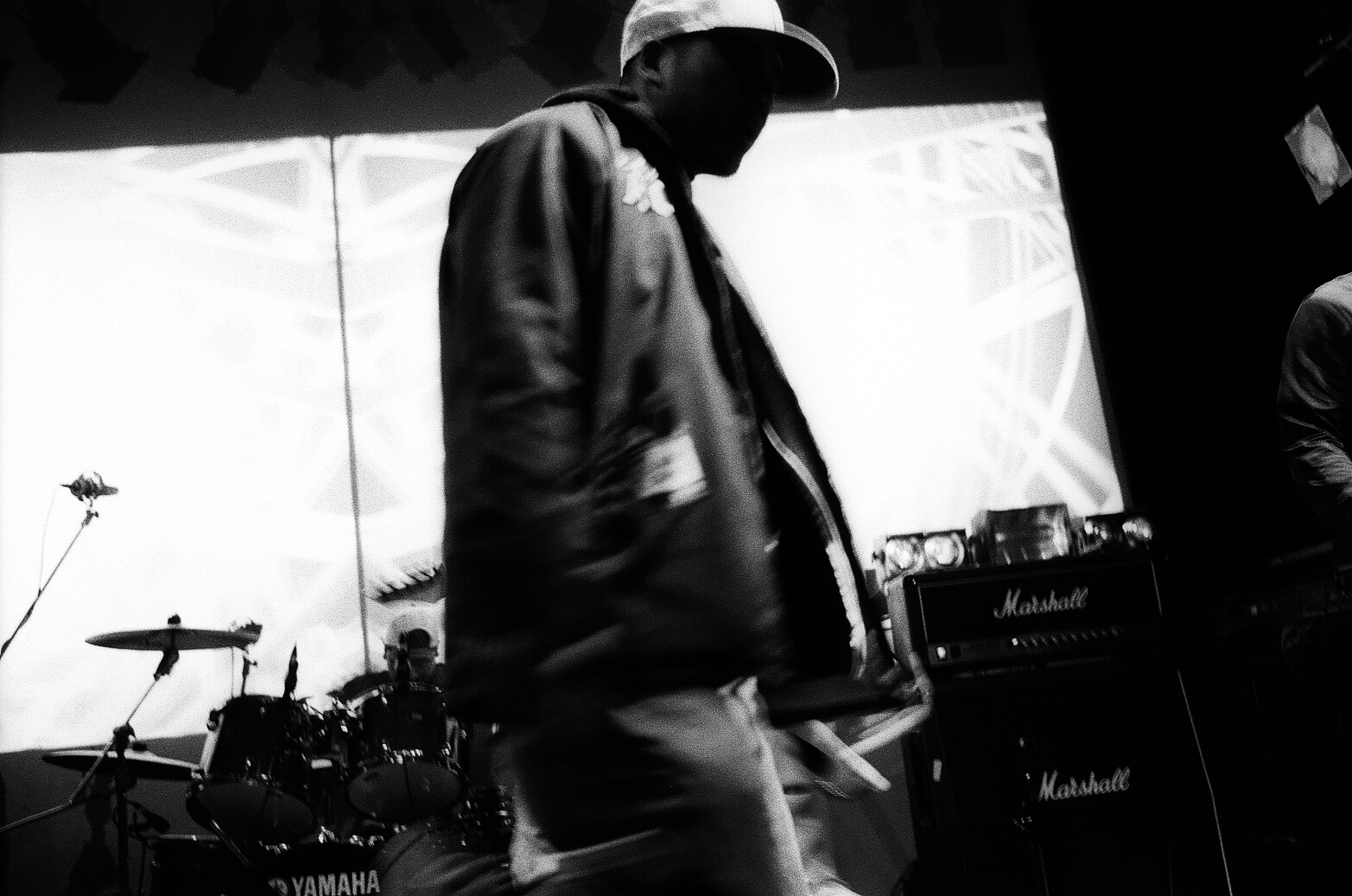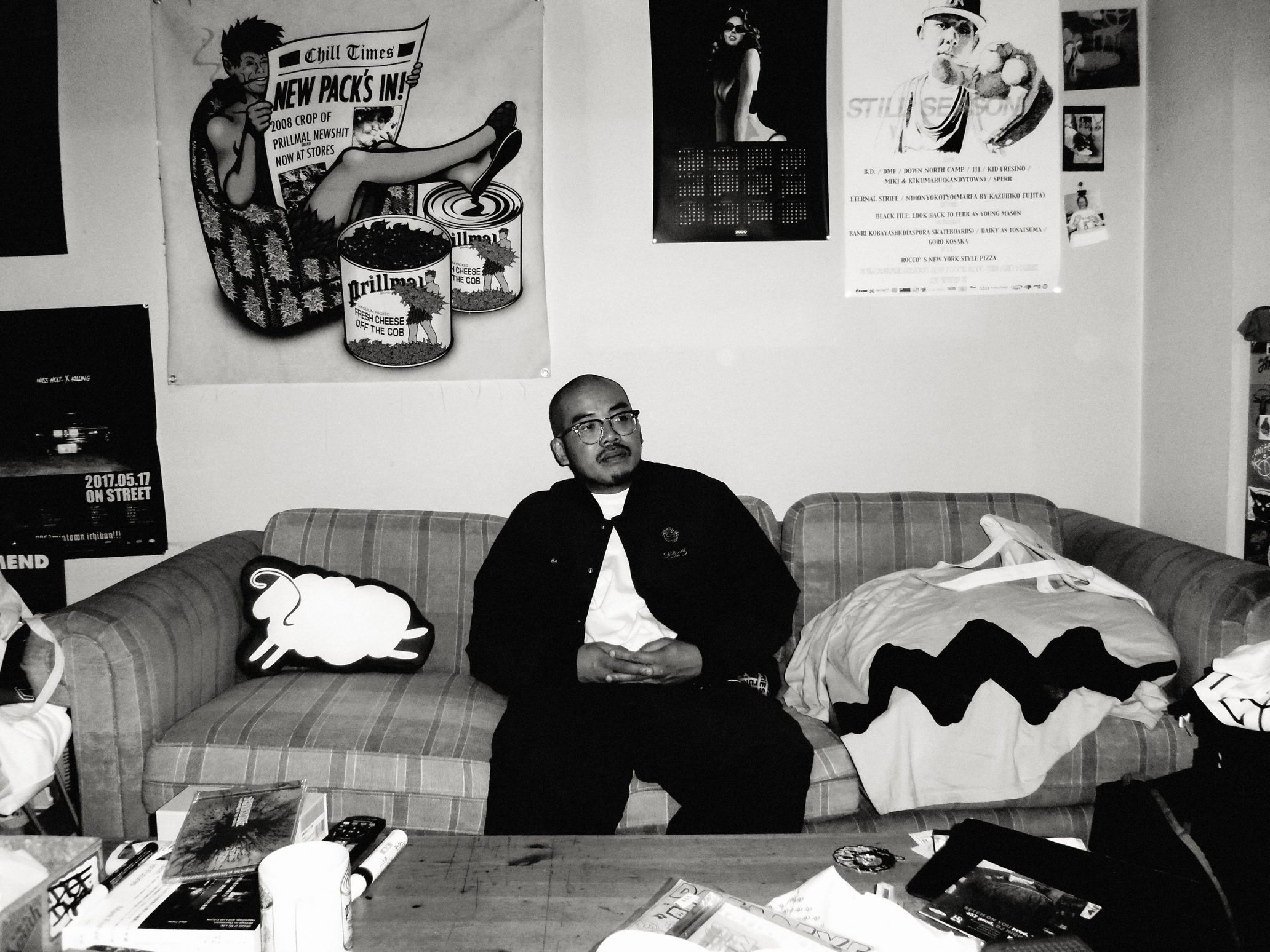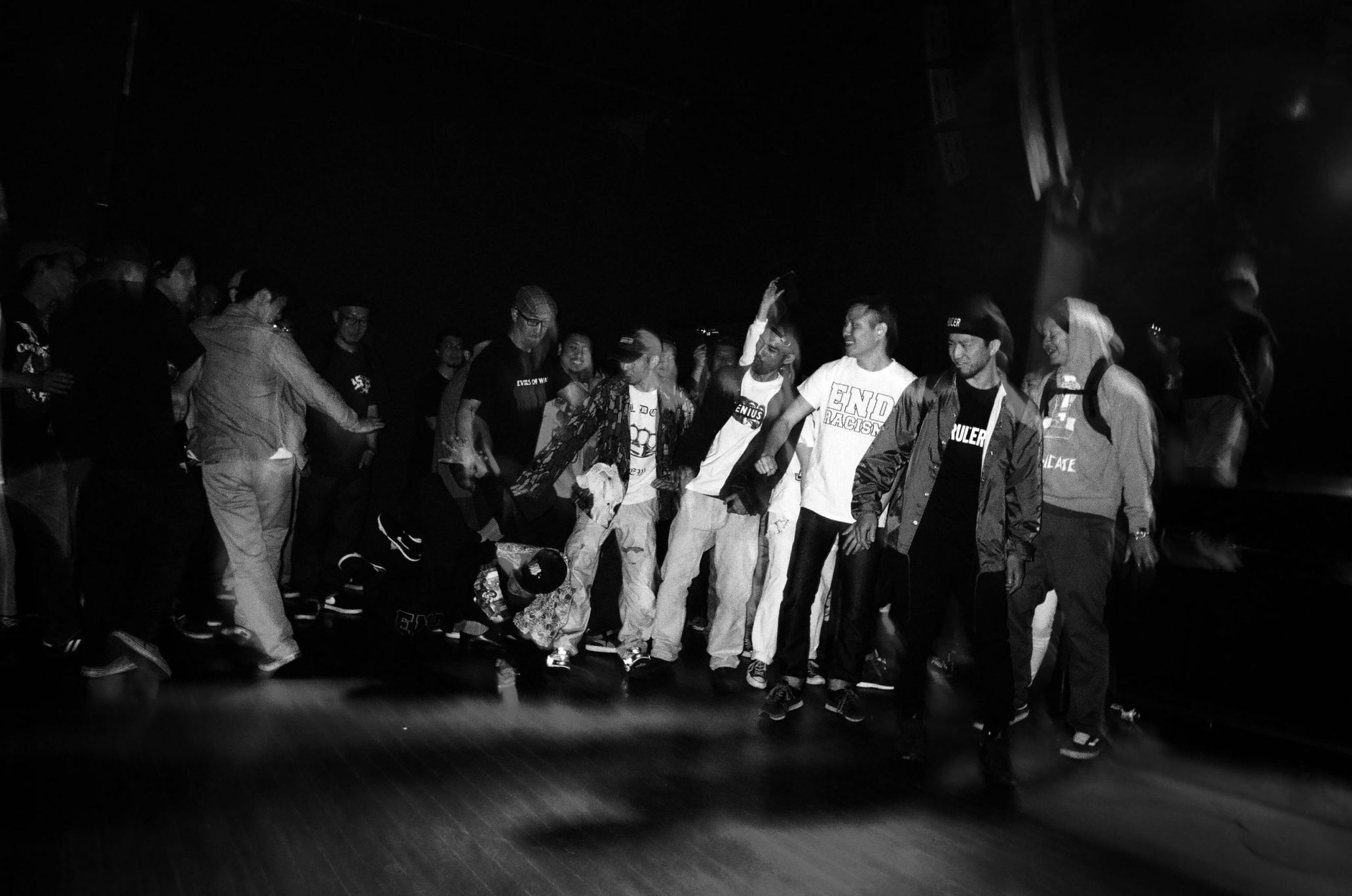WDsounds is a record label that has been leading Tokyo’s both hardcore and hip-hop underground scenes for more than a decade. We interviewed the owner of the label, Masashi Sawada. What are the thoughts born in the man known to have a hands-on approach, from experiencing the novel coronavirus pandemic? For the first half of the interview, we reflect together on the existential means and characteristics of hardcore and hip hop.
The intelligent music to cut up and get through the dull society
Economic distress, deteriorated public safety, and lousy daily life environment. New York—the city of glory since the modern era—was in peril in the 1970s to 1980s. However, if we look back broadly at the human history—not limited to the states—cultural evolution occurs to places that experience through rough times. Like how the Bauhaus design movement, appreciating concise forms, came to rise after the Spanish flu casted a pall over the world where the bold and sumptuous Art Nouveau was flourishing. It is said that Marcel Breuer has invented the minimal chair made of only plywood and pipes, to make easy cleaning possible. Basically, the spell of lurid embellishments has been broken, and the world has woken up and returned to its intrinsic state.
After the 1970s to 1980s, the scene of hardcore—the music faster, more rambunctious, and brasher than New York’s monumental punk rock band, Ramones—has intensified. Bad Brains, Minor Threat—these are among the bands that have influenced the straight edge spirited bands such as Agnostic Front, Madball, Cro-Mags, Youth of Today, Sick Of It All, Gorilla Biscuits…. Then, there is the techno-essence infused Youth Code that came in the scene later. Lyrics that are opulent in propagandistic lyricism. Shouts. Simplified refrains that are comprised only of power chords. Fast beats. Is it futile to compare these fierce hardcore elements to the examples of Bauhaus or Marcel Breuer?
Hardcore is not an atrocious music. If you think it is, the image of its roots—punk by and for the rogue—is somewhat adhered to your mind. It is worth getting rid of that scab of stigma for once (even if it hurts a bit.) Hardcore is in fact intelligent, rebellious and defiant music that severs and leads us through the dull society. The lead singer of Cro-Mags, John Joseph, has mentioned the following in Noisey’s documentary series UNDER THE INFLUENCE, a music content by VICE:
“It (people moshing fervently at gigs) was like a tribal dance that everybody was a part of—and it was a vibe, and it was a scene.
[With] punk rock, all they ever did was complain about shit— [they were like,] “fuck the mother fuckers.”
There was no solution (with their words and behaviors.)
[But] hardcore is about finding solution to the problems.”
He also added, “we were the fishermen to pull those souls in that were fucking damaged.”
However, the hip-hop/hardcore band of the same New York origin, Beastie Boys, would not abide by the aforementioned context. This is due to the reason because, essentially, Beastie Boys was born from Rick Rubin’s “device,” and heralded in the pop/major field. The defiant Caucasian band kids were fascinated by rap, and Rick was there to back them up. From the beginning of the band’s career, the young stars have accomplished huge live tours; however, even though they were daringly calling the party animals out in “Fight For Your Rights,” they eventually became party animals themselves, and for a moment, they blew up in the air into smithereens. After they were released from Rick’s hands, they were back to square one, and that was when they came up with the pure hardcore track, “Sabotage.” Since then, they have started pursuing freedom, emancipating their style, and crossing over multiple genres; for them, hardcore was (and must have been) the kind of music that “fished out their wounded souls from a dumpster.” Beastie Boys would probably be an underrated band within the purview of the proper hardcore scene, yet they are unequivocally the icon of New York back in those days. They are the representative of youth culture sparking change in detrimental situations, and mixture of hip-hop and hardcore that rose concurrently in the same epoch.
“When I produced FEBB’s THE SEASON, I just wanted to make sure it’s [paying homage to] New York.”
Masashi Sawada is the owner of the Tokyo hardcore/hip hop label, WDsounds (from hereunder, WD), vocalist of the hardcore band PAYBACK BOYS, who goes by the name Lil MERCY, and also a rapper under the alias J.COLUMBUS; he claims, out of the numerous works he has released, FEBB’s solo first album is the most remarkable masterpiece that shows deference to the aforementioned New York background and hip hop style that came in later, and deftly translates the style into Japanese (which goes without saying.)
“I think ‘hell rap’ only gets consumed, but you know, it’s here with us.” (Reference from Otaku IN THA HOOD)—FEBB implements his dexterous lyrical sense and relentlessly vents out his agitation in the album. What makes FEBB even more interesting is that long after THE SEASON was released right after the Great East Japan Earthquake, his smatterings of singles (“SKINNY,” “2 HOT,” “ICY,” and featuring for DJ BEERT’s collaborative single with the New York rap duo, Square Off, titled “What I Want”) came out during the Covid-19 pandemic as if they were emanated from the eternally 24-year-old apparition. As I compare the past and the present, I realize that what becomes vital in shitty circumstances is the explicit and simple Sendo (double-meaning of ‘agitation’ and ‘guidance’) that prominently blows off the depressing mood, and words and expressions that reinforce Sendo.
New York in the 1970s to 1980s, Art Nouveau, Spanish flu, Bauhaus. Ramones, Hardcore, Beastie Boys, and FEBB. It could be anything—at first, they seem to be coherent, but they are incoherent, and you can of course see them as dots or small single souls. However, at times, there are moments where these unrelated matters, accumulated in the brain tank, link up with one another on a whim. This time, I conversed with Sawada about such matter and value of information, and how to associate the information when expressing. What becomes important is—quoting Sawada’s words— “to see the view.” But we need to keep in mind that the “view” has “a possibility of an impending change and disappearing from our sight.” Ultimately, it would be best if we could capture everything from the actual cities, architectures, sufferings from diseases to profound energy and joy at live shows—yet in real life, we would need a time machine to witness every one of these things. The view could be a bookshelf in your room, CD or a record rack, clubs, stores or venues, which by the way are hard to go these days. It is about the daily experience, intimate view, and interaction with people that are starting to lose their intrinsic meanings.
The “inside” of a CD—exchange of information
Masashi Sawada : Sometimes, digital magazines end suddenly, when there were still articles, I was intending to read later. Plus, once they end, they are nowhere to be found as they aren’t like physical magazines. So, I try to copy and paste and save articles of my interview or anything that feature me.
――They aren’t physical materials, so when they end, they vanish completely. Do you intend on saving traces of your achievements you made as both Mercy (=Sawada) and WD?
Sawada: I would say yes. If I keep them as things, even if they leave my hands, they will continue existing somewhere—I think. Before I founded WD, I was working at a different hardcore record label, and released music of my old band from there. But that label doesn’t exist anymore, so now, I can’t release my old band’s music on digital platforms, even if I wanted to. Though it exists on CD. Also, all printed materials are saved as archives. I sometimes buy these (he takes out flyers and archive books of skinheads.) These can remain as physical materials. I presume these flyers haven’t got permissions to sell from the artists who designed them, so I’m sure they would be hard to be sold in mass.
――Speaking of physical formats and devices, now, it’s more common to listen to music through subscription services, and we can only see the front cover of the record. On the other hand, with physical formats like CD and records, the inside cover is detailed and packed with texts and important information including staff credits; with subscription services, we don’t get to see those parts.
Sawada: It’s a good source for us to procure information when looking for an engineer and recording site. The information “inside” the CD is extremely important to us as it allows us to imagine and gauge if any of these engineers would be able to help us achieve our ideal sounds.
――I’m sure the information would lead you to many things. With WD, would you continuously put out music on CDs and vinyl?
Sawada: There are some that are released only in digital formats due to the reason because they had to be put out promptly. Though, I prefer releasing music on CDs, and I want to continue doing so.
――This might be deviating from the topic a bit but, as you’ve been running the label for a long term, do you see any changes in numbers of people buying CDs?
Sawada: The number is changing, but I don’t feel it. There’s no drastic ups and downs either. It’s definitive though that we’re receiving strong support from consistent customers.
――Fans in hardcore and hip-hop fields seem to be ardent and consistent. I have an impression that they are all quite faithful.
Sawada: I agree. Our CDs or stuff are sold more in private stores than in big retailers. We’ve established a good rapport constantly sharing and exchanging our thoughts with the store owners. I think this is one of the reasons why the CD sales hasn’t been dramatically affected so far.
――How did you get connected with these people?
Sawada: For example, last year, when a record store (LiE RECORDS) opened in Toyokawa-city, Aichi, which could’ve already existed, this person I’ve known for a long time contacted me asking if it’s okay for him to give my contact to the store owner as he wanted to have our CDs on their shelves. There are cases like this for stores to start carrying our products. But in the old days, we used to send sample CDs to stores without being asked—attaching a message saying, “If you are interested, please give it a listen.” I don’t think that stance has changed to this day. Though, we don’t send out sample CDs via email anymore. If someone sends me an email with a big data, I will think it’s sus [laughs].
―― (laugh) You’re right, people would think it’s a spam. They’d be happy with a simple CD.
Sawada: Also, what’s good about CDs is that when I meet someone at a club, I can give them my CD telling them casually, “if you’re interested, please give it a listen”—as a way of saying hi and letting them know what I’m up to lately.
――Hip hop and hardcore might appear rough and full of machismo, but in fact, they’re not; I think they’re fond of love and pure hearted. There are quite a lot of stores that exude their admiration for the music. Personally, I’m vexed with the fact that their “exuberant love” isn’t being understood enough. I know at gigs, people mosh, and you see the aggressive side, but these people are moshing as a diligent gesture to show love to the music, and I think that’s the right way to express. I think WD has constructed a scene, where we can feel that passion the most in Tokyo.
Sawada: Thank you. I definitely understand what you mean as I was one of those guys, who used to hang out in stores all the time. I’m from Saitama, and there was a guy older than me, who worked at a convenience store in my hometown and was playing in a hardcore band; one day I went to the convenience store wearing a cap, and he noticed me and said, “Ah, so you’re Mercy, I heard about you from a friend.” Since then, I’d go to the store late at night or whenever the store seemed vacant, and he taught me all sorts of bands and a lot of other things. It all started from things like that; in middle school, I moved to Tokyo, and went to stores like UP STATE in Harajuku, where all the band guys would hang out, and gathered information as much as I could. Some of the guys, who lived like me at that time, got into hip hop. By the way, BLYY, who released from SUMMIT, was my middle school classmate. Other guys got into digging soul records, and everyone was doing different things, but it was fun exchanging information with these people. We were sort of competing with one another on who’s got the freshest new information.
――I like how you guys don’t have any barriers among one another. In other fields, people could be clannish—like, they don’t approve of things other than what they think is good.
Sawada: I think everyone has a fear of missing out what’s fun. You see, mind-blowing music could pop up out of nowhere. People may say, “it’s more interesting to explore hip hop tracks that sample some random weird tunes.” But, if you dig further on your own, you end up listening to songs that are very similar. Even if you were listening to music of different genres from hip hop, hardcore, soul, reggae, to house, the songs you listen to could still be related. Every time you meet someone, who could introduce you to unknown things, you would be able to get rid of your entrenched notions. That’s why exchanging information with others is extremely important. Even for a person owing a record label, music becomes a routine. So, you’ve got to reassess once in a while.
Masashi Sawada
Born in 1979. While he owns a record label, WDsounds, he takes part in producing records of artists including SENNINSHO, FEBB, CAMPANELLA, and ERA; he is a rapper himself under the alias J.COLUMBUS. He is also a lead singer of the hardcore punk band, PAY BACK BOYS. A member of the readers collective, Riverside Reading Club.
http://wdsounds.jp
Photography Teppei Hori



